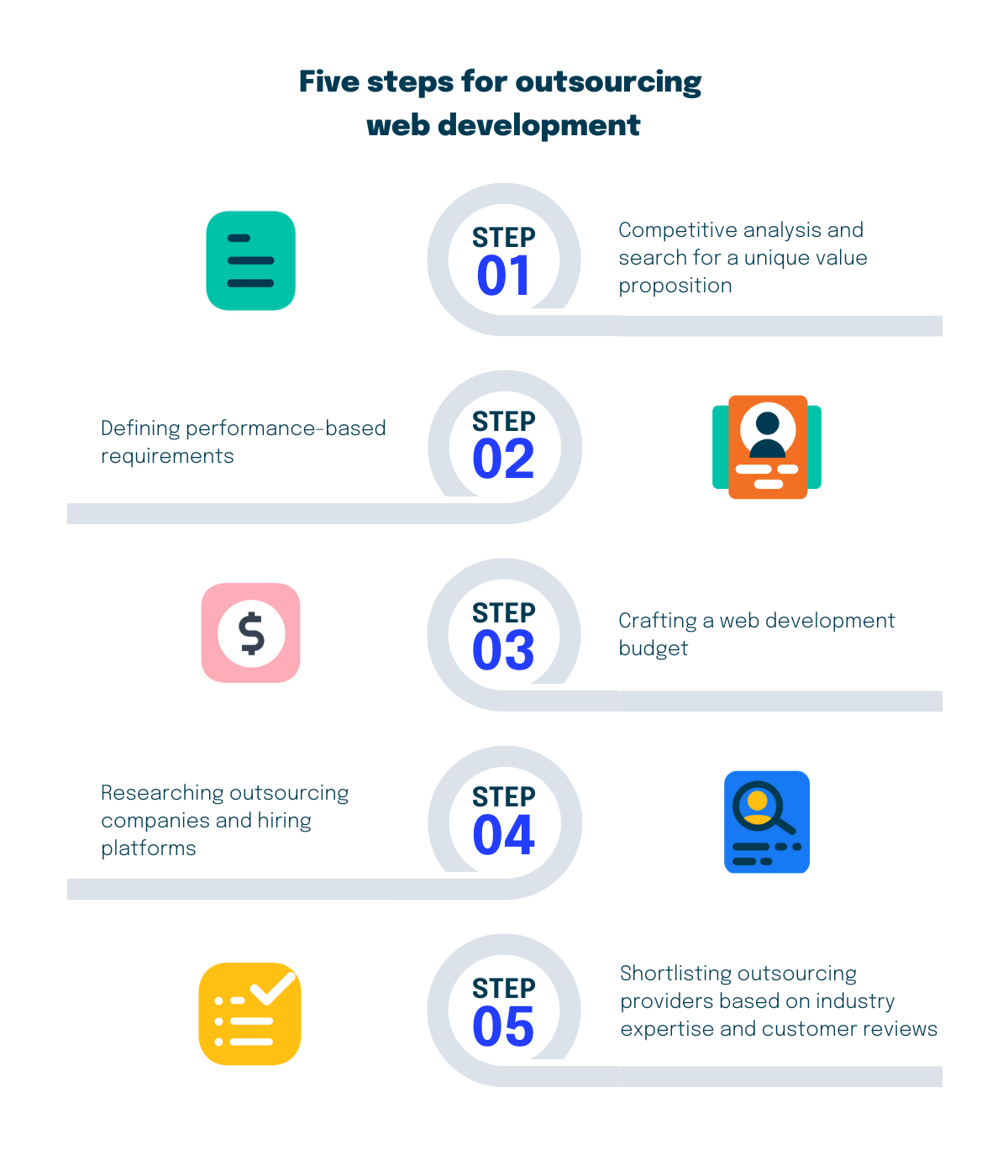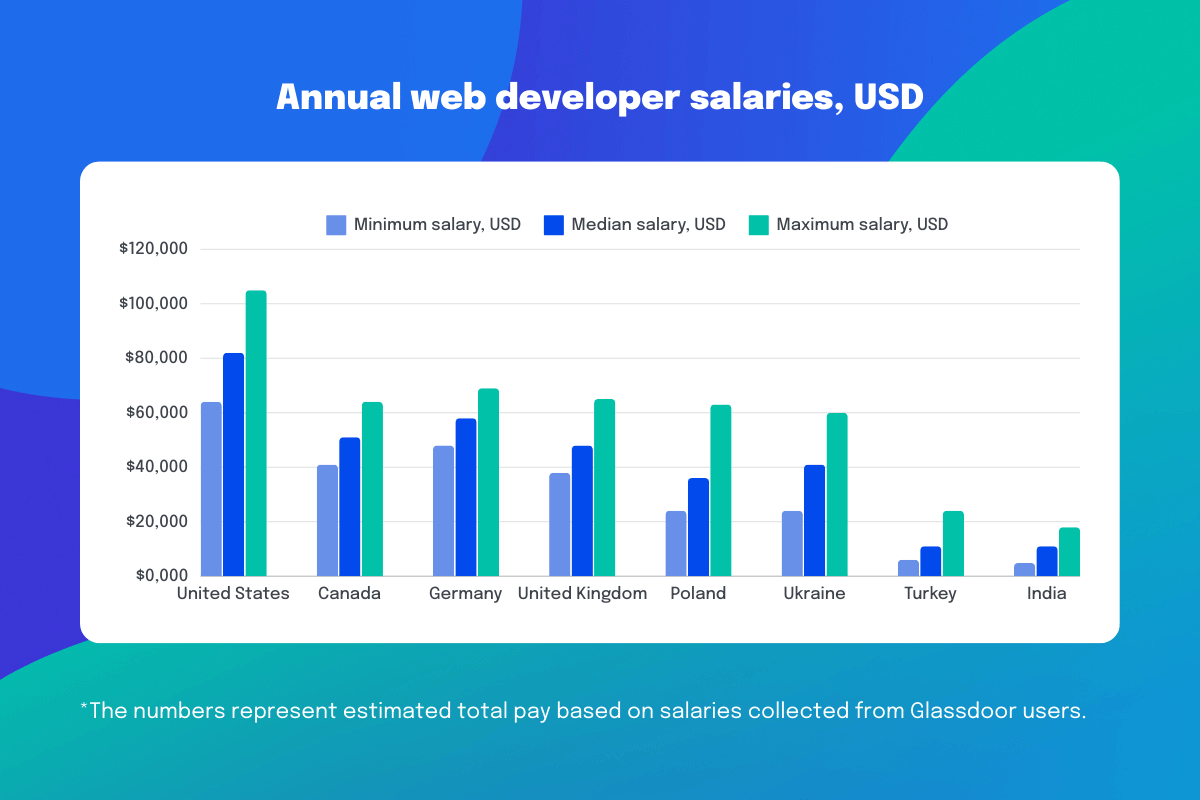In this comprehensive guide, we reflect on our many years of experience in hiring and vetting offshore web developers and software agencies. You will learn about the benefits and features of web development outsourcing, the types of services offered by external providers, and four options to hire web developers. This article also discusses the five steps of outsourcing a project, the cost of hiring a web developer in different countries, and compares hiring platforms with advanced vetting processes and extensive talent pools to help you find the perfect team for your next project.
Table of Contents
What is Web Development?
Web development is creating, building, and maintaining websites for the Internet or private networks. The difficulty of websites can vary, ranging from a single static page of plain text to complex web applications, e-commerce platforms, and social media services.
Web development usually covers the non-design aspects of building web services, such as writing markup using HTML, applying styles with CSS, and coding using technologies like JavaScript and Node.js. In addition, web development may involve utilizing content management systems (CMS) like WordPress and Joomla to build websites and populate them with content, requiring little to no programming skills.
What is Web Development Outsourcing?
Web development outsourcing is a business practice that involves hiring an external provider to handle a planned or existing web development project that was traditionally carried out in-house by the company’s own employees. Companies opt for outsourcing to reduce development costs, relieve the in-house team of additional responsibilities and non-essential tasks, or access web developers with specific skill sets and experience that may not be readily available in the local market.
To get a better idea of how web development outsourcing works, let’s explore the most popular types of outsourcing, such as project-based outsourcing, staff augmentation, and hiring a dedicated team.
- In project-based outsourcing, the vendor estimates the project budget and sends the specification to the client for approval. Once all the details of the project have been agreed upon, the vendor assigns the necessary number of web developers to work under its management. Companies opt for this type of outsourcing when they require a project to be completed entirely by a development shop that provides UX research, UI/UX design, software engineering, project management, and quality assurance.
- Staff augmentation involves full-time software engineers working at outsourcing agencies, providing clients with the flexibility to rapidly scale up or down their internal web development team. Unlike project outsourcing, the management of the augmented team is handled by the client. Companies turn to staff augmentation to speed up the development process, reduce technical debt, or free internal teams from non-essential tasks.
- In contrast to staff augmentation, hiring a dedicated team suggests a more involved role for the vendor in managing the outsourced project. It usually implies a broader partnership than can encompass a wide range of software services, including project management, quality assurance, business analysis, as well as web design, in the context of visual and aesthetic aspects of a website.
What types of services do web outsourcing companies provide?
Custom Web App Development
Custom web application development is the process of designing, building, deploying, and maintaining an application that meets the goals and needs specific to your business and industry. Unlike commercial off-the-shelf solutions, custom software development focuses on a narrowly defined, individual set of requirements. The result of a custom development process is improved application performance, better search engine optimization, and effective integration with your business.
Custom development begins with an outline of the user journey and the technologies and features needed to make that journey possible. Before calculating project costs, the company determines which features are mandatory and which can be implemented later. To do this, the company analyzes the market, conducts UX research, and reviews the concept of the existing business model.
Web Integration Services
Website integration is the process of connecting and managing data from different sources, such as another website, system, or application. Website data integration eliminates the need to manually copy and paste data into key systems, saving time, reducing human error, and ultimately helping you better understand your customers and their behavior. Examples of web integrations include securely sending transaction data to a payment gateway in real-time, sending contact form data directly to a CRM system, and automatically importing new user signups into your Mailchimp contact list.
Web Development Consulting
Web development consultants offer professional advice on the architecture, design, development, and troubleshooting of web software. They can also serve as hiring advisors, assessing software vendors, and helping with integrating external providers with in-house development teams.
Consultants stay up-to-date with the latest web development trends and have a deep understanding of programming languages, web frameworks, design principles, data analytics, and legacy system upgrading. Companies hire web development consultants when they require assistance in building and optimizing their web software, cloud migration, conducting a UX audit, implementing an SEO strategy, and personalizing their website.
With more emerging trends in web development, new outsourcing services will continue to evolve.
A Step-by-Step Guide for Web Development Outsourcing
These steps may vary for different companies and projects, as clients often determine the strategy, UX research, and development budget after discussions with the vendor. However, we provide the most crucial steps for companies that are outsourcing their web development.
Step 1: Conduct Market Research and Brainstorm Ideas
Before outlining a web development project’s requirements, companies conduct in-depth market analysis and UX research to find out what the end users of a service or product need and want. Companies also perform business analysis to identify growth points and brainstorm ideas to determine what makes the software different from the competition.
Step 2: Define the Project Goals and Requirements
The web project description and requirements include a summary of objectives, methods, tools, and web frameworks to be used and define a desired set of skills and experience. In addition, the company’s technical leads and hiring managers define performance-based requirements to set clear expectations for the web development vendor.
Step 3: Decide on the Budget
Identify the number of professionals to be hired, their rates or salaries, and the hiring platform or outsourcing company commission.
Step 4: Research the Outsourcing Companies and Hiring Platforms
Here are examples of review websites and online platforms for hiring web developers and development teams that you can explore, depending on your project timeline and requirements:
- YouTeam: A staff augmentation marketplace where you can hire full-time vetted contractors;
- Upwork, TopTal: These platforms are suitable if you’re looking to hire freelance web developers;
- G2, Clutch: Review websites where you can find an outsourcing provider and assign the entire project to them or hire a dedicated team.
Step 5: Create a Shortlist of Outsourcing Providers
Before deciding to reach out and sign the contract with a web development agency, you should focus on their portfolio, industry expertise, and customer reviews. You should also check whether an outsourcing company or marketplace adheres to international security standards and contractual agreements on intellectual property transfer and data protection. After reviewing the aforementioned criteria, you’ll narrow down the shortlist of the most suitable web development companies.
What Are Your Different Options for Hiring Web Developers?
Hiring Nearshore and Offshore Web Developers vs. Local Hiring
Depending on the geography, there are three options for hiring web developers: you can find local talent, hire a nearshore software engineer, or trust an offshore developer. The latter two options are more often discussed in the context of outsourcing, while hiring local talent is more likely to involve traditional in-house hiring.
Hiring Nearshore and Offshore Web Developers
Nearshore and offshore outsourcing gives companies access to a larger pool of developers, which helps fill skill gaps when the required talent is not readily available in the local market. Unlike in-house hiring, outsourcing web development reduces administrative and recruiting costs and relieves the company of the obligation to integrate new specialists into the internal team and develop a long-term plan for their career development.
The hiring process for these two options is quite similar. First, you look for development companies or hiring platforms with good ratings. B2B rating platforms such as G2 and Clutch provide customer reviews before hiring web development companies.
Finally, companies can also find web development agencies by attending regional events such as tech conferences and meetups.
Hiring Local Web Developers
Hiring local talent usually means that web developers join your team and work in the same office. This allows closer communication between development team members and other teams. Even if engineers work remotely or in a hybrid model, they are still in the same time zone, which is more convenient for scheduling calls with the team.
When we talk about hiring local developers, we usually mean traditional hiring methods, such as searching for candidates on LinkedIn or browsing job boards like Wellfound or Glassdoor.
You can also search for developers by hosting or attending local hackathons and tech conferences, as offline events seem to be picking up pace after the COVID outbreak. Finally, you can request an in-house web developer from headhunting firms.
Hiring Web Developers: Four Hiring Models
Staff Augmentation
Staff augmentation is a solution for companies that need to quickly expand their web development team with additional talent or find niche skills unavailable in the local market. This option utilizes already vetted software engineers employed by development agencies and helps companies not worry about operational and administrative costs.
As with in-house developers, companies manage contract developers and communicate directly with each one. In addition, team augmentation is as secure as in-house hiring, as it typically offers standardized, locally-compliant contracts, trial periods, safe intellectual property transfer, and data protection.
However, staff augmentation requires management attention during onboarding to align workflows and establish communication between in-house and remote teams.
Outsourcing
If a company chooses to outsource web development, it contacts an agency, evaluates the quality of engineering talent, and agrees on the project requirements and goals. Then, an outsourced development team will work on the project remotely.
Tech companies use this business practice to focus on the core aspects of their business, assigning app development and maintenance to outside organizations managed by the CTO or product owner of the in-house team.
However, outsourcing limits communication and knowledge transfer between the company and external providers. If the provider does not maintain clear documentation, you may come across some features or scripts that are unclear to you. In addition, the hiring company may find it difficult to find the vendor of the right size. A small outsourcing agency will leave no room for growth because it cannot be easily scaled up or down. On the other hand, large outsourcing companies may have a less personalized approach, which may result in higher costs.
Freelancing
Companies hire freelancers to complete short-term projects and small tasks. The main advantage of hiring freelancers is that there are numerous platforms like Upwork with thousands of specialists readily available to start the web project.
However, even though freelancers are the fastest employment type, this hiring model comes with the risk of project delays and cancellations. In contrast to dedicated outsourcing teams and contractors, freelancers often juggle multiple projects, and the quality of their work may not meet the client’s expectations. Tech companies don’t have the same level of control over a freelancer as they do with an employee or a full-time contractor.
Alternative to Outsourcing: In-House Hiring
Companies don’t always choose to outsource, even though it can reduce costs. For example, a project may require the highest level of confidentiality and security, and the company might find it difficult to discuss these issues with an outside vendor. Companies prioritizing faster team communication may also prefer to retain all web developers in-house. Lastly, in-house hiring is the most common option during the core development stage. Internal employees are typically the most dedicated—they delve into the product details and develop the best solutions because of their commitment to the company’s long-term goals.
However, this type of hiring can be time-consuming because, in addition to candidate requirements, companies must create a detailed onboarding and career development plan for in-house employees and align the company’s long-term goals with each candidate’s skills and experience to ensure their expertise will be helpful in future projects.
How Much Does It Cost to Hire a Web Developer?
We’ve compiled a list of annual web developer salaries based on data extracted from Glassdoor. The following numbers represent estimated total pay based on salaries collected from the platform’s users. For this spreadsheet, we have chosen the “most likely range” within the 25th and 75th percentile of all available salary data for a web developer role.
| Country | Minimum salary, USD | Median salary, USD | Maximum salary, USD |
| United States | $64,000 | $82,000 | $105,000 |
| Canada | $41,000 | $51,000 | $64,000 |
| Germany | $48,000 | $58,000 | $69,000 |
| United Kingdom | $38,000 | $48,000 | $65,000 |
| Poland | $24,000 | $36,000 | $63,000 |
| Ukraine | $24,000 | $41,000 | $60,000 |
| Turkey | $6,000 | $11,000 | $24,000 |
| India | $4,800 | $11,000 | $18,000 |
*Web developer annual salaries, all years of experience. Source: Glassdoor.
We’ve also calculated the average hourly rates for contract developers registered on the YouTeam platform who cited web development as their core expertise.
| Country | Average hourly rate, USD |
| Ukraine | $40 |
| Poland | $54 |
| Greece | $50 |
| Mexico | $50 |
*Web developer hourly rates. Source: YouTeam.
Browse 500+ Dev Teams Available for Hire
Where to Find and Hire Web Developers?
In this section, we provide four options to hire web developers for organizations that need to scale up or down their web development team, advance their projects quickly, and delegate non-essential tasks to outside vendors.
1. YouTeam
YouTeam helps tech companies quickly scale up or down web development teams. The platform is a single point of access to a combined talent pool of hundreds development agencies located in Latin America and Europe.
Before adding the agency to the network, YouTeam meets with its CEO, CFO, and project managers, while its legal team runs compliance checks into the agency’s background, legal records, and previous clients.
In addition to vetting their partner agencies, YouTeam conducts interviews and in-depth screening of potentially suitable candidates for each open position. Each client is assigned a matching expert who remains with the client throughout the entire cooperation with contractors, assisting with onboarding, scaling the team up or down, and handling replacements. YouTeam also automates contract signing and billing between clients and software development agencies.
YouTeam also provides its clients with an AI assistant that helps to build a customized vetting process for each role’s responsibilities and skillset. The assistant takes the project requirements and vision of the ideal candidate, and creates individual tech skills assessments, coding tasks, and soft skills questions. The vetting process is then used to shortlist matching candidates from YouTeam’s talent pool.
2. Arc
Arc.dev grew out of Codementor, an online platform for software development mentorship. Built on top of the vibrant Codementor community, Arc helps to find and hire web developers and engineering consultants.
The platform offers permanent full-time engineers and part-time freelancers. During the vetting process, software engineers record a self-introduction video, which Arc reviews for remote work compatibility, English proficiency, and communication skills. Applicants also undergo a tech interview and pair programming sessions.
Throughout the cooperation, the Arc team assists with onboarding and regularly reviews developer projects to ensure performance meets their quality standards.
Most Arc web developers are located in the U.S., Europe, and Latin America.
3. Toptal
Toptal is a platform that offers freelance web developers for mission-critical software projects. The platform’s screening process includes a comprehensive language, personality, and communication interview, and a technical interview to assess their skills and problem-solving abilities. In addition, each candidate undergoes live tests to evaluate their coding experience and completes a real-world test project.
Finally, Toptal assigns an industry expert to the client to understand their goals, technical needs, and team dynamics. The expert then accompanies the new developer through a trial period, ensuring they are the right fit before starting the engagement.
4. Turing
Turing is a hiring platform that offers full-time contractors and managed web development teams. It provides automatic time tracking, virtual daily stand-ups, and time zone management to give clients more visibility into remote developers’ work.
The company tests developers for English fluency and knowledge of programming languages, data structures, algorithms, system designs, and frameworks. Each developer also undergoes an automated work experience survey comprising questions in five areas — project impact, engineering excellence, communication, people, and direction.
Since most of Turing’s clients are based in the U.S. and work on PST (Pacific Standard Time), web developers are required to have a 4-hour overlap within this timezone to ensure successful communication.
In addition to finding contractors that meet specific company requirements, Turing offers IT services such as cloud migration, data engineering, AI implementation, and application assessment.
Comparison Table
| YouTeam | Arc | Toptal | Turing | |
| Pool of developers | Full-time employed engineers from software development agencies | Part-time freelancers, full-time contractors | Freelancers | Full-time contractors, managed teams |
| Pricing | YouTeam’s commission is 10% of the developer’s rate. The average rate of a senior engineer is $60/hour or $9K/month. | A custom fee per hire. Permanent contractors’ yearly salaries range from $50,000 to $200,000. Freelance contractors’ hourly rates range from $60-$100/hour. |
Developers’ hourly rates range from $100-$150/hour. Requires an initial deposit of $500 as a credit to the first invoice once you make a hire. The deposit is refundable. |
Turing’s service fee (TBD) |
| Geography | Developers located in Latin America and Eastern Europe | Most of the developers are located in the U.S., Europe, and Latin America. | Most talent located in the Americas and Europe | Worldwide |
| Vetting | – Compliance checks into each agency’s background, legal records, and previous clients – English pre-interview – Soft skills interview – Tech interview – Verifying the skillsets through HackerRank for Work |
– Application screening – Coding assessment – Hands-on project – Behavioral interview – Technical interview with a senior engineer |
– Language, personality, and communication interview – Technical interview – Live tests to evaluate coding experience – Real-world test project |
– Automated technical skills test – English proficiency test – Communication skills interview |
| Quality guarantee | Risk-free 1 month trial period | – Risk-free trial period of up to two weeks (for freelance positions) – 3-month guarantee (for permanent roles) with the option to be matched with another developer free of charge |
Trial period of up to two weeks | Risk-free two-week trial period |
| Time to get a verified list of candidates | 2 business days | 3 days | Several days | 3 to 5 business days |
| Time to contract | 1 week | 2 weeks for full-time roles; 24-72 hours for hourly contractors |
0-3 weeks | No data |
How to Hire Web Developers with YouTeam?
The process of hiring web developers with YouTeam looks like this:
- You request a call and describe your web development project and vision of the ideal candidate.
- Your Matching Expert creates an Ideal Candidate Profile that meets your criteria, such as tech stack, industry experience, and professional development interests.
- YouTeam finds suitable web developers among hundreds of partner agencies. Our experts pre-screen talent to create a shortlist of candidates who most closely match your Ideal Candidate Profile. The first batch of profiles will be ready in 48 hours.
- You receive and review your candidate shortlist and select which web developers you want to interview. If you are not satisfied with your shortlist, the Matching Expert will source new candidates.
- The final stage is contract signing. YouTeam contracts are locally-compliant and standardized, saving you time in case of hiring several developers from different agencies.
- YouTeam offers free replacements, a 1-month risk-free trial period, and a money-back policy.
FAQ
What Questions to Ask When Outsourcing Web Development?
Here are the most critical questions to ask to ensure that your outsourcing provider meets the highest standards of reliability:
-
- Who were your previous clients? Have you had experience working with companies based in the U.S., U.K., or EU?
- Are you able to provide documents for due diligence procedures?
- What are your criteria for hiring web developers? How do you validate their skill sets?
- Where is your web development team located?
- Will my potential development team be completely dedicated to my project?
- How will our company be involved in the development process?
- What development tools and frameworks do you use?
- Do you provide quality assurance?
- How do you ensure the security of a web application?
What Are the Benefits of Outsourcing Web Development?
Outsourcing implies hiring an external provider to handle a planned or existing web development project that was traditionally carried out in-house by the company’s own employees. Companies opt for outsourcing to reduce development costs, relieve the in-house team of backlogged projects and non-essential tasks, or access engineers with niche expertise that may not be readily available in the local market.
What Are the Risks Associated With Outsourcing?
Full-time contractors can work on side projects. There have been many cases of people working full-time for multiple companies, especially during the period of record tech job openings in 2021 and early 2022. Juggling multiple projects ultimately affects code quality, so the hiring company needs someone with a technical background on the team to spot such changes.
In addition, some agencies use a tricky strategy where they initially reduce prices, but later increase the budget. The long-term outcome of such a relationship is that the longer you work with the agency, the more you depend on it, and the more expensive it will be for you to replace it. Therefore, it should be a wake-up call if you find engineers with rates significantly lower than the market, for no obvious reason.
YouTeam solves the problem with agencies because it verifies each partner. In addition, the platform enables you to choose talent, not a company, and hire from multiple providers through a single standardized process.
What Are the Options for Outsourcing Web Development?
Outsourcing options depend on the project requirements, complexity, and the stage of the company’s life cycle. Hiring an outsourcing agency is a reasonable choice when you need specific expertise, such as data engineering, which may take years for your internal team to master. Hiring contractors via staff augmentation is the best option for building secondary products and experiments. Additionally, contractors are hired by companies with limited runway that need to move quickly to keep up with the product’s demand. Finally, you are more likely to hire freelance engineers for testing feature ideas and handling other small tasks that you don’t want to distract your team with.
However, for the core development stage, when your product needs polishing and you make frequent changes, it is better to hire in-house web developers.
How Much Does It Cost to Hire a Web Developer?
The cost of hiring a web developer depends on the hiring method and the company’s requirements. The median annual salary for an in-house web developer is $82,000 in the United States, $58,000 in Germany, and $41,000 in Ukraine. For contract offshore developers, the average hourly rates are $40 in Ukraine, $54 in Poland, and $50 in Mexico.









